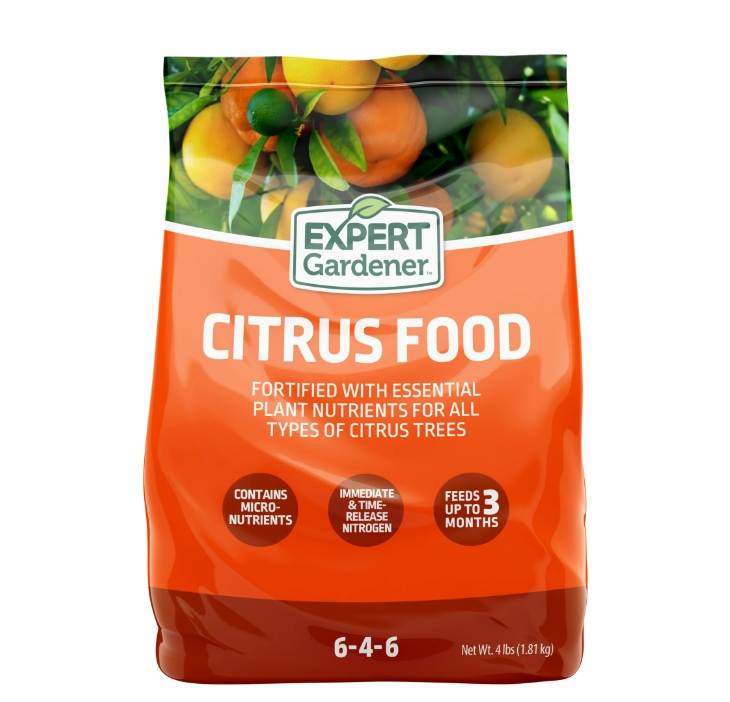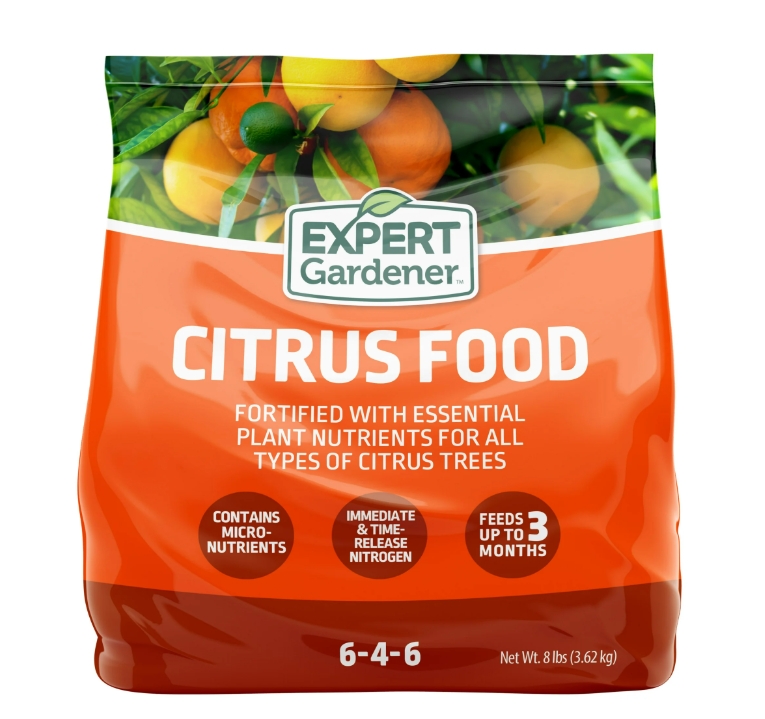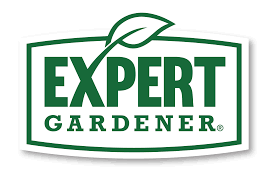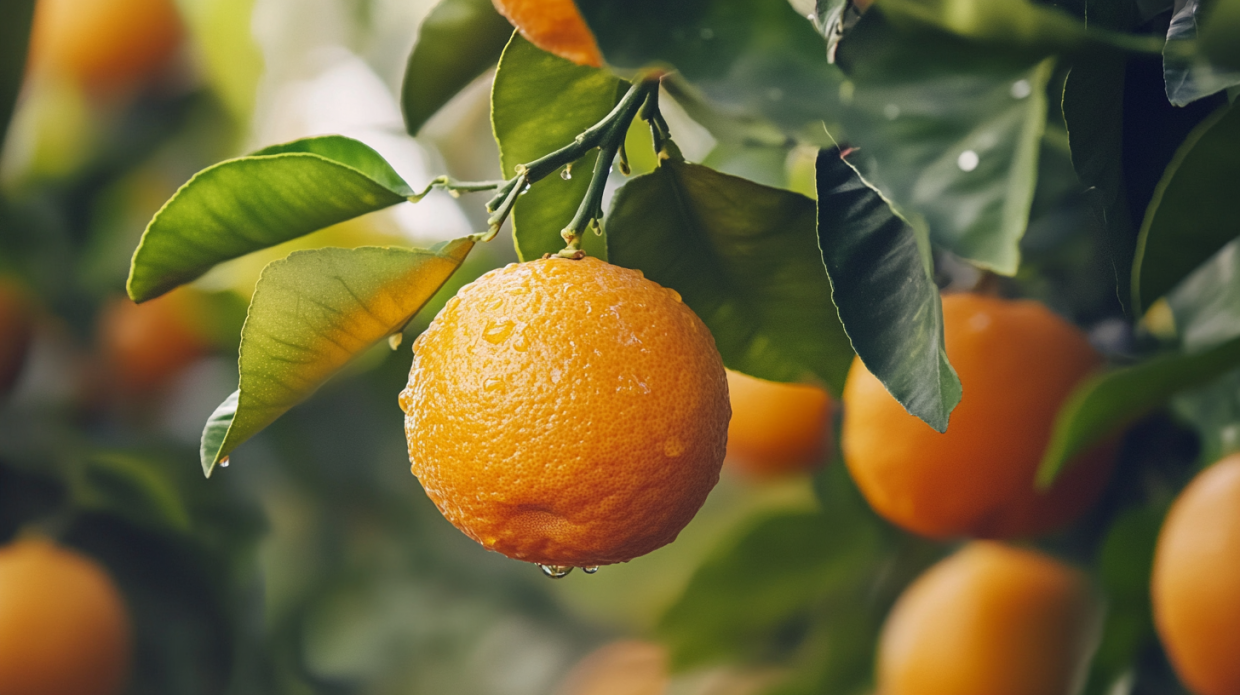
Expert Gardener Citrus Plant Food Fertilizer 6-4-6, 4 lb.
- Citrus Plant Food that contains micronutrients to support overall plant health
- Contains time-release nitrogen to feed your citrus trees up to 3 months
- 6-4-6 N-P-Kfertilizer
- For use on all types of citrus trees
- Can be used on citrus trees from 1 to over 10 feet tall
- 4 lb. ;Bag
- 0.185 cu. ft. bag
- Condition: New
$5.97

Expert Gardener Citrus Plant Food Fertilizer 6-4-6, 8 lb.
- Citrus Plant Food that contains micronutrients to support overall plant health
- Contains time-release nitrogen to feed your citrus trees up to 3 months
- 6-4-6 N-P-K fertilizer
- For use on all types of citrus trees
- Can be used on citrus trees from 1 to over 10 feet tall
- 8 lb. ; 0.185 cu. ft. bag
- Condition: New
$9.97
I still remember the day I brought home my first Meyer lemon tree. It was a scraggly little thing with just a handful of leaves, purchased on a whim during a spring garden center sale. Five years later, that same tree is the crowning jewel of my backyard orchard, producing dozens of sweet, juicy lemons twice a year. The secret to this transformation? Understanding the specific nutritional needs of citrus trees and finding the perfect fertilizer to match.
After years of experimentation, trial and error, and consulting with fellow citrus enthusiasts, I’ve discovered that Expert Gardener Citrus Food is the gold standard for anyone serious about growing healthy, productive citrus trees. Whether you’re a novice grower with a single potted lime tree or a seasoned gardener with a backyard orange grove, this comprehensive guide will walk you through everything you need to know about this game-changing fertilizer.
What Exactly Is Expert Gardener Citrus Food?
Expert Gardener Citrus Food is a specialized fertilizer formulated specifically for the unique nutritional requirements of citrus trees. Unlike general-purpose plant foods, this product contains a precise blend of macro and micronutrients that citrus varieties particularly crave.
When I first encountered Expert Gardener Citrus Food, I was skeptical. Could a specialized fertilizer really make that much difference compared to the all-purpose stuff I’d been using? The answer, as my flourishing trees now demonstrate, is a resounding yes.
The fertilizer comes in a granular form that’s easy to measure and apply. It has a distinctive, earthy scent that’s not unpleasant—I actually find it smells like promise and potential, though my wife laughs when I say this. The granules are designed to release nutrients gradually, providing steady nourishment rather than the feast-or-famine cycle that can stress plants and lead to nutrient runoff.
The Nutritional Profile: Understanding the NPK Ratio
If you’re new to fertilizers, you’ll quickly encounter the term “NPK ratio,” which refers to the proportion of three essential macronutrients: Nitrogen (N), Phosphorus (P), and Potassium (K). Expert Gardener Citrus Food typically has an NPK ratio of 9-3-9, which reflects the specific needs of citrus trees.
Let me break down what each of these nutrients does:
Nitrogen (9%): This is the element responsible for vibrant, green foliage. It promotes vegetative growth, helping your citrus tree develop a full, lush canopy. I’ve found that adequate nitrogen is particularly important in spring when trees are actively putting out new growth. However, too much nitrogen can lead to excessive leaf production at the expense of fruit, which is why balanced fertilizers like Expert Gardener Citrus Food are so valuable.
Phosphorus (3%): While present in smaller amounts, phosphorus plays a crucial role in root development, flowering, and fruit production. It helps transfer energy throughout the plant and is essential for healthy fruit development. In my experience, trees with adequate phosphorus produce more abundant and larger fruit.
Potassium (9%): This element is vital for overall plant health and stress resistance. It helps regulate water movement within the plant, improves disease resistance, and enhances fruit quality. I’ve noticed that trees with sufficient potassium seem to handle both drought and cold snaps better than those that are deficient.
Beyond these primary nutrients, Expert Gardener Citrus Food also contains essential micronutrients that are particularly important for citrus:
Iron: Prevents yellowing leaves (chlorosis) and keeps foliage vibrant
Magnesium: Essential for chlorophyll production and photosynthesis
Manganese: Aids in enzyme activation and metabolism
Zinc: Critical for growth hormone production and internode elongation
Copper: Helps with reproductive growth and enzyme activity
Sulfur: Assists with chlorophyll formation and protein synthesis
The presence of these micronutrients is what truly sets specialized citrus fertilizers apart from general-purpose options. I learned this lesson the hard way when my first orange tree developed yellowing leaves despite regular fertilizing with an all-purpose product. The issue was iron deficiency, and it resolved quickly after switching to Expert Gardener Citrus Food.
Is Expert Gardener Citrus Food Organic or Synthetic?
This is one of the most common questions I receive from fellow gardeners, and the answer requires some nuance. Expert Gardener Citrus Food is primarily a synthetic fertilizer, meaning the nutrients are derived from chemical processes rather than directly from plant or animal materials.
However, this doesn’t mean it’s harmful to your garden ecosystem. Modern synthetic fertilizers are precisely formulated to provide exactly what your plants need without excessive fillers. The controlled-release technology helps prevent nutrient leaching, which can actually make them more environmentally friendly than some organic options that release nutrients in less predictable ways.
That said, if you’re committed to organic gardening, there are organic citrus fertilizers available. These typically use ingredients like fish emulsion, bone meal, and composted manure to deliver nutrients. They work well but generally release nutrients more slowly and may require more frequent application.
I personally use Expert Gardener Citrus Food for most of my established trees while supplementing with organic compost to improve soil structure and microbial activity. This hybrid approach gives me the best of both worlds—immediate nutrient availability plus long-term soil health.
When and How to Apply Expert Gardener Citrus Food
Seasonal Application Schedule
Timing is everything when it comes to fertilizing citrus trees. After years of experimentation, I’ve settled on the following schedule for my zone 9b garden:
Early Spring (February-March): This is the most important feeding of the year, as it supports the flush of new growth and spring flowering. I apply a full dose according to package instructions.
Late Spring (May-June): A second application helps support fruit set and early development. I typically use about 75% of the recommended amount.
Mid-Summer (July-August): In hot climates, I skip this feeding or apply a very light dose, as citrus growth often slows during extreme heat.
Early Fall (September-October): A final application helps trees prepare for winter and supports fall fruit development. I use about 75% of the spring dose.
For those in colder regions, you may want to skip the fall feeding if your trees go dormant earlier. Conversely, in tropical areas where citrus grows year-round, you might maintain a more consistent feeding schedule with smaller, more frequent applications.
Application Methods: Getting It Right
The way you apply fertilizer can be just as important as the type you choose. Over the years, I’ve refined my technique to maximize nutrient uptake while minimizing waste.
For in-ground trees, I follow this process:
- Water the tree thoroughly the day before fertilizing.
- Measure the appropriate amount of fertilizer based on the tree’s age and size (more on this below).
- Spread the granules evenly under the canopy, starting about 6 inches from the trunk and extending slightly beyond the drip line.
- Scratch the fertilizer lightly into the top inch of soil using a hand rake.
- Water again thoroughly to help the nutrients begin to dissolve and prevent root burn.
For container-grown citrus, the process is similar but requires more precision:
- Calculate the appropriate amount based on container size (usually about half to two-thirds the rate for in-ground trees of similar size).
- Distribute the granules evenly around the pot, keeping them at least 2 inches from the trunk.
- Scratch very lightly into the surface, being careful not to disturb too many roots.
- Water thoroughly until you see drainage from the bottom of the container.
One trick I’ve learned: for container plants showing signs of nutrient deficiency that need a quick boost, I sometimes dissolve a small amount of the granules in water (about 1 tablespoon per gallon) and use this as a supplemental feeding between regular applications. This provides more immediate results while waiting for the slow-release granules to do their work.
Dosage Guidelines: Finding the Right Balance
Determining the correct amount of fertilizer is where many gardeners, including myself in my early days, make mistakes. The key to successful citrus fertilization is providing enough nutrients to support growth without overdoing it.
Expert Gardener Citrus Food typically comes with detailed instructions, but here’s my general guide based on tree age and size:
Young trees (1-2 years old):
- In-ground: 1-2 tablespoons per application
- Container: 1/2-1 tablespoon per application
Medium trees (3-5 years old):
- In-ground: 1/4-1/2 cup per application
- Container: 1-2 tablespoons per application
Mature trees (6+ years old):
- In-ground: 1-2 cups per application, depending on size
- Container: 2-4 tablespoons per application
I always err on the conservative side with new trees or when I’m unsure. You can always add a bit more later if the tree shows signs of needing additional nutrients, but recovering from over-fertilization is much more challenging.
Signs Your Citrus Tree Needs Fertilizer
Learning to “read” your citrus trees is perhaps the most valuable skill I’ve developed over the years. Trees have a way of telling us what they need if we pay attention to the signals. Here are the key indicators I look for that suggest it’s time for an application of Expert Gardener Citrus Food:
Yellowing leaves (particularly newer growth): Often indicates nitrogen deficiency
Yellowing leaves with green veins: Typically a sign of iron or manganese deficiency
Stunted or slow growth: May suggest overall nutrient deficiency
Small, pale fruit: Often indicates potassium deficiency
Twig dieback: Can signal severe nutrient deficiencies
Poor flowering or fruit set: May indicate phosphorus deficiency
I’ve learned to take a “whole tree” approach to diagnosis. Occasional yellow leaves, especially older ones, are normal and not necessarily cause for concern. But when patterns emerge across multiple leaves or branches, it’s time to evaluate your fertilization routine.
The Benefits of Using Expert Gardener Citrus Food
After using Expert Gardener Citrus Food consistently for several years, I’ve observed numerous benefits that make it worth the investment:
1. Increased Fruit Production
The most obvious benefit is greater yield. My Meyer lemon that once produced a dozen fruits now regularly gives me 40-50 lemons per season. My blood orange, which struggled to produce any fruit in its first three years, now provides a generous harvest after switching to a proper citrus fertilization routine.
2. Improved Fruit Quality
It’s not just about quantity—the quality of fruit has noticeably improved as well. The rinds are smoother, the juice content higher, and the flavor more complex. I’ve even noticed that properly fertilized trees tend to produce fruit that stores longer after harvest.
3. Enhanced Disease Resistance
Well-nourished trees are significantly more resistant to common citrus diseases and pests. My properly fertilized trees show fewer signs of leaf miners, citrus scale, and fungal issues compared to when they were nutrient-deficient.
4. Vibrant Foliage
Healthy citrus trees should have deep green, glossy leaves. Since using Expert Gardener Citrus Food, the foliage on my trees has become noticeably more lush and vibrant. This isn’t just aesthetic—robust foliage means more photosynthesis and energy production for the tree.
5. Faster Recovery from Stress
Florida gardeners know that occasional freezes are inevitable. After a cold snap damaged several of my citrus trees two years ago, I noticed that the ones on a regular feeding schedule with Expert Gardener Citrus Food recovered much more quickly, putting out new growth within weeks rather than months.
Common Mistakes to Avoid
Even with the right fertilizer, there are several pitfalls that can undermine your success. Here are the mistakes I’ve made (so you don’t have to):
1. Over-fertilization
In gardening, more is not always better. Excess fertilizer can burn roots, cause excessive vegetative growth at the expense of fruit, and contribute to environmental pollution through runoff. I now follow package instructions religiously and even tend to use slightly less than recommended.
2. Inconsistent Timing
Citrus trees thrive on routine. Sporadic feeding—heavy one season and none the next—creates stress and inconsistent growth patterns. I now mark fertilization dates on my calendar to maintain a regular schedule.
3. Ignoring Soil pH
No matter how good your fertilizer is, nutrients won’t be properly absorbed if your soil pH is off. Citrus prefers slightly acidic soil (6.0-7.0 pH). I test my soil annually and adjust as needed with sulfur to lower pH or lime to raise it.
4. Fertilizing Dry Soil
Applying fertilizer to dry soil can cause root burn. I always ensure the soil is moist (but not soggy) before application and water thoroughly afterward.
5. Fertilizing Sick or Stressed Trees
Trees that are actively fighting disease, recovering from transplant shock, or stressed from extreme weather need time to recover before fertilizing. I’ve learned to hold off on feeding until I see signs of new growth and recovery.
Using Expert Gardener Citrus Food for Container-Grown Citrus
Container cultivation presents unique challenges for citrus trees. Restricted root space means nutrients can be depleted more quickly, and drainage patterns differ from in-ground planting. After much experimentation, I’ve adapted my approach for my potted citrus collection:
Frequency Adjustments
Container citrus generally needs more frequent feeding than in-ground trees. I typically apply Expert Gardener Citrus Food every 6-8 weeks during the growing season, using about half to two-thirds the amount recommended for in-ground trees of similar size.
Special Considerations
Potted citrus can be more susceptible to nutrient leaching due to frequent watering. To counteract this, I occasionally supplement with a water-soluble citrus fertilizer between granular applications, especially if I notice signs of deficiency developing.
Container mix also tends to break down over time, becoming more compacted and less effective at nutrient exchange. I refresh the top 2-3 inches of soil in my containers each spring before the first fertilizer application, being careful not to disturb too many roots.
Complementing Expert Gardener Citrus Food with Other Amendments
While Expert Gardener Citrus Food provides excellent comprehensive nutrition, I’ve found that supplementing with a few additional amendments creates the ideal environment for truly thriving citrus:
Compost
Adding a 1-2 inch layer of quality compost under the drip line of in-ground trees annually improves soil structure, enhances microbial activity, and provides slow-release nutrients that complement the more immediately available ones in the fertilizer.
Epsom Salts
Occasionally, I supplement with a light application of Epsom salts (magnesium sulfate), especially if I notice leaves with green veins but yellow tissue between them (interveinal chlorosis), which often indicates magnesium deficiency.
Mycorrhizal Fungi
When planting new citrus trees, I inoculate the planting hole with mycorrhizal fungi, which form a symbiotic relationship with the roots, significantly enhancing nutrient uptake and water efficiency.
Mulch
While not a nutrient source per se, maintaining a 2-3 inch layer of organic mulch (keeping it several inches away from the trunk) helps conserve moisture, regulate soil temperature, and slowly adds organic matter as it breaks down.
Long-Term Storage of Expert Gardener Citrus Food
Proper storage ensures your fertilizer remains effective from season to season. I learned this lesson the hard way after leaving a bag in my humid garden shed only to find it had absorbed moisture and clumped into an unusable mass.
Now I store unused fertilizer in a sealed plastic container in my garage, away from direct sunlight and moisture. The original bag goes inside this container, with the opening tightly rolled and secured with a clip. With this method, I’ve successfully kept fertilizer viable for over two years.
Can Expert Gardener Citrus Food Be Used for Other Fruit Trees?
While designed specifically for citrus, I’ve experimentally used Expert Gardener Citrus Food on other acid-loving fruit trees with positive results. My blueberry bushes responded particularly well to it, and I’ve had decent success with my peach tree as well.
However, I wouldn’t recommend it for plants with significantly different nutritional needs, like apples or cherries, which generally require less specialized nutrient profiles.
My Journey to Citrus Success: Before and After
When I think back to my early citrus growing attempts, the contrast is stark. My first orange tree struggled with yellowing leaves, dropped its fruit prematurely, and grew so slowly I wondered if it was even alive some seasons. I tried various remedies—more water, less water, more sun, less sun—before finally addressing the real issue: proper nutrition.
The transformation once I began using Expert Gardener Citrus Food consistently was remarkable. Within a single growing season, the new growth was deeper green, the tree put on nearly a foot of height, and for the first time, it held onto its developing fruit until maturity.
Today, that same tree—now eight years old—is the centerpiece of my garden. It produces reliable harvests of juicy oranges, maintains glossy green foliage year-round, and even survived a unusual cold snap that damaged many other plants in my garden.
Final Thoughts: Is Expert Gardener Citrus Food Worth It?
After years of experimentation with various fertilizers and growing methods, my conclusion is unequivocal: for anyone serious about growing healthy, productive citrus trees, Expert Gardener Citrus Food is an essential investment. The specialized nutrient profile, ease of application, and consistent results make it superior to general-purpose fertilizers for citrus cultivation.
That said, no fertilizer is magical. Success with citrus still requires attention to fundamentals: proper planting, appropriate watering, adequate sunlight, and vigilance against pests and diseases. Expert Gardener Citrus Food is best viewed as one important element—albeit a critical one—in a holistic approach to citrus care.
For newcomers to citrus growing, my advice is simple: start with quality trees from reputable sources, plant them correctly, and fertilize appropriately from the beginning with a specialized product like Expert Gardener Citrus Food. This foundation will give you the best chance of enjoying abundant harvests of sweet, juicy fruit for many years to come.
As I sip fresh-squeezed orange juice from my own backyard harvest, I’m reminded that good gardening isn’t about finding shortcuts—it’s about understanding what your plants truly need and providing it consistently. Expert Gardener Citrus Food has helped me do exactly that for my citrus collection, transforming struggling specimens into thriving trees that produce more fruit than my family can eat.
Whether you’re nursing a single potted lemon tree on an apartment balcony or tending a backyard orchard, giving your citrus the specific nutrition it craves is perhaps the single most important factor in your success. And in my experience, Expert Gardener Citrus Food delivers exactly that—season after season, year after year.
Happy growing!

